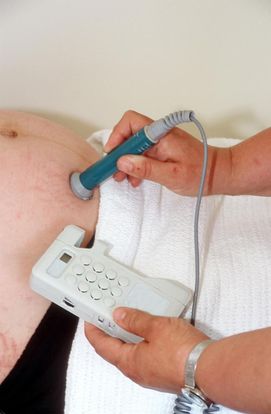38 weeks and 5 days pregnant

In many ways you will be the best judge of the likely size of your baby, especially if you can compare it with a previous pregnancy. An ultrasound scan can estimate the weight, but as with all other measurements at this time it has a fairly wide margin of error.
Don’t just wait for contractions – it’s worth familiarizing yourself now with the signs that may mean labour is imminent.
When does labour actually start?If it’s your first pregnancy, it can be difficult to recognize the signs that the baby is on his way. Some women get lower back pain that is niggling before becoming painful. You might notice a show, which can happen well before true labour actually starts. Your waters may break as the sac containing the amniotic fluid bursts open. Even if your waters breaking is not accompanied by contractions you should still inform your labour ward.
Finally, the most obvious sign is contractions: these painful tightenings of your uterus will increase in intensity and become more regular as labour progresses. Contractions are associated with the dilation and shortening of your cervix, so your midwife will examine you to see how far you’ve progressed.
If you do think that you have gone into labour, stay calm and telephone the labour ward at your hospital. Inform them of your symptoms and, especially, describe your contractions. If you’re having contractions every 5 minutes that last for one minute (time them), and they’re so uncomfortable that you’re forced to stop what you’re doing, you should think about going to hospital. If you’re having your baby at home, you should call your midwife.
If there are no complications or reasons for concern, your baby’s heartbeat will usually be monitored using a hand-held Doppler ultrasound device. Once your labour is well under way, your midwife will listen to your baby’s heartbeat for 60 seconds after a contraction every 15 minutes in the first stage of labour and for 60 seconds after a contraction every 5 minutes in the second stage of labour.
If you’ve had complications in pregnancy, or problems develop during labour, the midwife may monitor the heartbeat using a CTG.

How long am I likely to stay in hospital after the birth?
In most maternity units, there’s a degree of flexibility as to how long you remain in hospital. If you wish to stay for as brief a period as possible, talk to your midwife. The minimum length of time in hospital is six hours after delivery.
Many mothers stay overnight to rest and gain some confidence in caring and feeding their newborn, under the midwives’ guidance, especially if it’s their first baby.
How long you stay in hospital will largely depend on your type of delivery. If you have a vaginal birth, you should be able to go home after six hours, but a Caesarean may mean you need to stay in for about three days. If your baby is born early, is unwell, or is struggling to feed or maintain his temperature, you’ll be advised to stay in hospital. If your baby has to remain in hospital for a long period, you would have to go home and visit him in the special care baby unit.
Be the first to support
Be the first to share
Comment (0)
Related Blogs & Vlogs
No related events found.
Loading more...